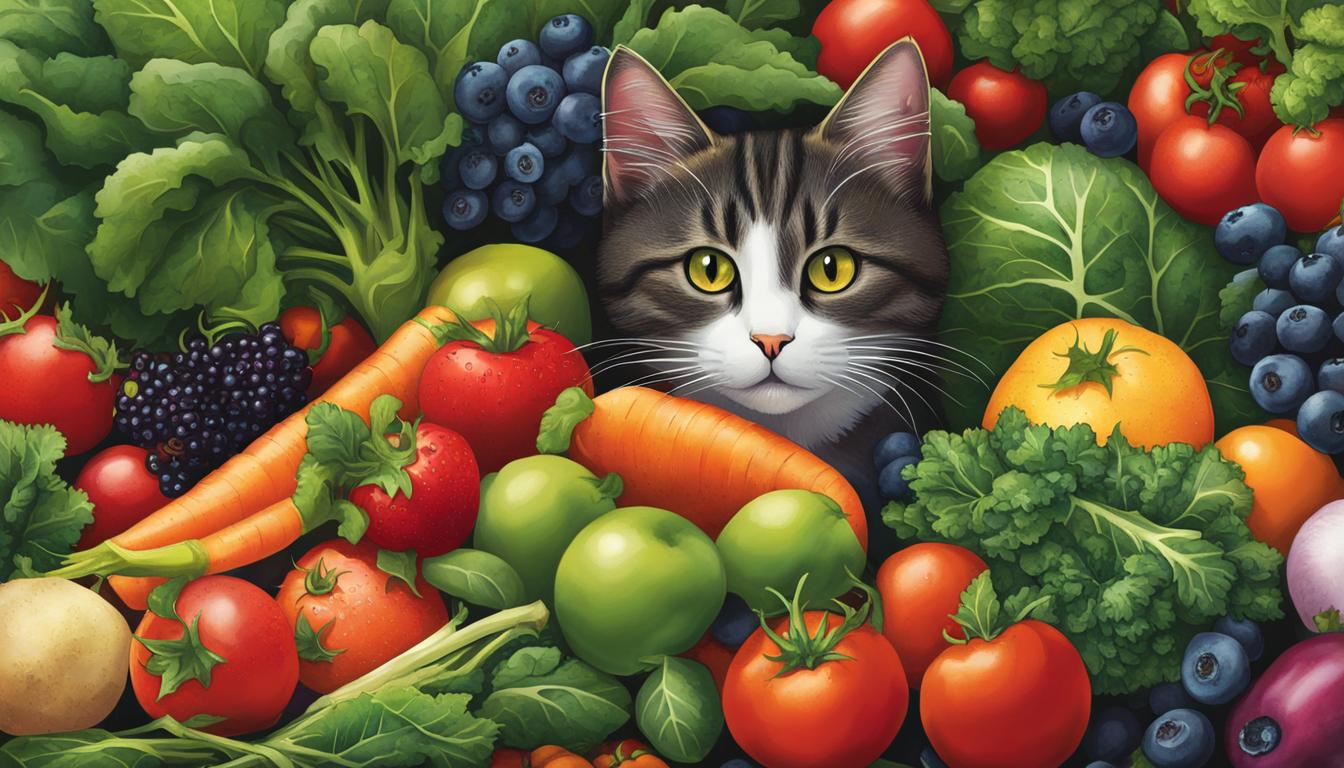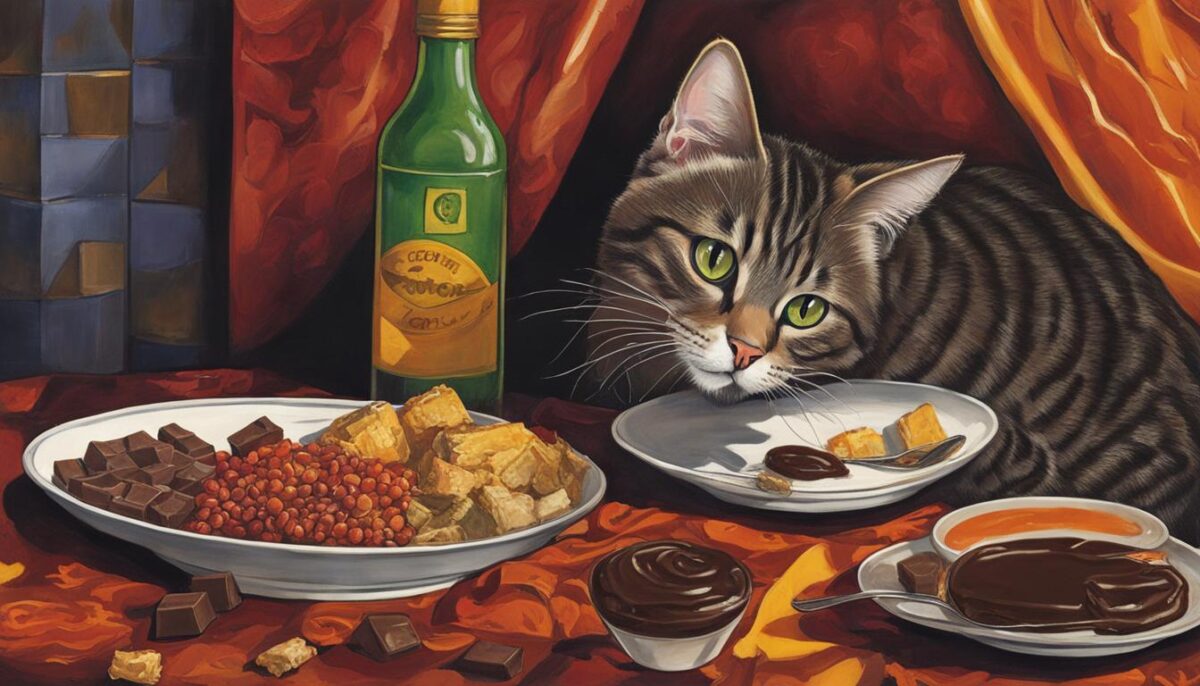As a cat owner, you may have wondered whether it’s safe for your furry friend to eat tomatoes. Cats are curious creatures, and it’s natural to question what foods are suitable for them. In this article, we will delve into the topic of cats and tomatoes, exploring the truth behind feline diets.
Key Takeaways:
- Cats can eat tomatoes, but precautions should be taken.
- Remove any green parts of the tomato before feeding it to your cat.
- Some cats may be allergic or experience digestive upset from tomatoes.
- Tomatoes should be an occasional treat and not a significant part of a cat’s diet.
- Cats require a primarily meat-based diet for optimal health.
The Dangers of Onions, Garlic, and Other Toxic Foods for Cats
Cats are curious creatures, and as their owners, we want to ensure their safety and well-being. While tomatoes may be safe for cats to eat, there are other foods that can pose serious health risks to our feline friends. Onions, garlic, and members of the Allium family contain compounds that can be toxic to cats and should be avoided in their diet.
These ingredients can cause digestive upset, loss of appetite, lethargy, and even anemia in cats. It’s important to be cautious when feeding cats human foods that may contain onions or garlic, such as soups, sauces, or certain seasonings. Always check the labels and avoid any food products that may contain these toxic ingredients.
To ensure your cat’s health and well-being, it’s best to stick to a diet that consists of high-quality, meat-based cat food. Cats are obligate carnivores, and their bodies are designed to thrive on a diet rich in animal proteins. By providing them with well-balanced and nutritious cat food, you can help maintain their overall health and prevent any potential harm caused by toxic foods.
Table: Toxic Foods for Cats
| Foods | Toxic Compounds | Health Risks |
|---|---|---|
| Onions | N-propyl disulfide | Anemia, digestive upset, loss of appetite |
| Garlic | Allium compounds | Anemia, digestive upset, loss of appetite |
| Other Allium family members (leeks, chives, shallots) | Allium compounds | Anemia, digestive upset, loss of appetite |
| Alcohol | Ethanol | Liver damage, brain damage, respiratory issues |
| Chocolate | Theobromine, caffeine | Vomiting, diarrhea, increased thirst, tremors, seizures |
| Caffeine | Caffeine | Nervousness, increased heart rate, tremors |
“As a cat owner, it’s essential to be aware of the foods that can be harmful to your furry companion. Onions, garlic, alcohol, chocolate, and caffeine should never be given to cats, as they can cause serious health issues. Stick to a diet that is specifically formulated for cats, and consult with your veterinarian if you have any concerns or questions about your cat’s diet.”
Remember, when it comes to your cat’s health, prevention is key. By understanding the dangers of certain foods and providing a safe and balanced diet, you can ensure that your feline friend stays healthy and happy.
The Truth About Tomatoes for Cats
While tomatoes themselves are not toxic to cats, it’s important to be cautious when it comes to their consumption. Cats have specific dietary requirements as obligate carnivores, meaning their primary source of nutrition should come from high-quality, meat-based cat food. However, tomatoes can be enjoyed in moderation after ensuring they are free from any potentially harmful parts.
Some cats may be allergic to tomatoes or experience digestive upset after consuming them. To introduce tomatoes into your cat’s diet, it’s best to start small and monitor their reactions. If your cat enjoys the taste of tomatoes and shows no signs of discomfort, they can be included as an occasional treat.
However, it’s crucial to remember that tomatoes should not make up a significant portion of a cat’s diet. Cats require essential nutrients found in meat, such as taurine, which is crucial for their overall health. Therefore, it’s best to consult with a veterinarian before making any significant changes to your cat’s diet.
The Potential Risks of Tomatoes for Cats
While tomatoes themselves are generally safe for cats, certain parts of the plant can be harmful. The leaves and stems of the tomato plant contain solanine, a toxic substance that can cause gastrointestinal upset and even be poisonous to cats. Therefore, it’s important to remove any green parts of the tomato before feeding it to your cat.
| Safe Foods for Cats | Toxic Foods for Cats |
|---|---|
|
|
Remember, your cat’s health should always be your top priority. While it’s tempting to share our meals with our feline companions, it’s important to be aware of the foods that can be harmful to them. If you have any concerns or questions regarding your cat’s diet and health, it’s best to consult with a veterinarian for personalized advice.
The Truth About Tomatoes for Cats
While cats are obligate carnivores and their diet primarily consists of meat, many cat owners wonder if they can include other foods, such as tomatoes, in their furry friend’s meals. So, can cats eat tomatoes? The answer is yes, but with some precautions.
Tomatoes themselves are not toxic to cats, but it’s important to be aware of certain parts of the tomato plant that can be harmful. The leaves and stems of tomatoes contain solanine, a toxic substance that can cause gastrointestinal upset in cats. Therefore, it’s crucial to remove any green parts of the tomato before feeding it to your cat.
Additionally, some cats may be allergic to tomatoes or experience digestive upset after consuming them. As with any new food, it’s best to introduce tomatoes gradually and monitor your cat for any adverse reactions. If your cat enjoys the taste of tomatoes and shows no signs of discomfort, it can be included as an occasional treat in their diet. However, tomatoes should not make up a significant portion of a cat’s diet, as they are carnivores and require a predominantly meat-based diet.
The Benefits of Safe Foods for Cats
While tomatoes should be given in moderation to cats, there are other safe foods that can provide nutritional benefits. Some examples include:
- Cooked lean meats, such as chicken or turkey, can be a good source of protein for cats.
- Small amounts of cooked eggs can be a nutritious addition to a cat’s diet.
- Canned pumpkin, in small quantities, can help with digestion and provide fiber.
It’s essential to consult with a veterinarian before making any significant changes to your cat’s diet. They can provide guidance based on your cat’s specific needs and help ensure they are receiving a balanced and nutritious diet.
Table: Safe and Unsafe Foods for Cats
| Safe Foods for Cats | Unsafe Foods for Cats |
|---|---|
| Lean meats (cooked) | Onions |
| Cooked eggs (small amounts) | Garlic |
| Canned pumpkin (small quantities) | Chocolate |
| Broccoli (cooked) | Alcohol |
| Blueberries (in moderation) | Caffeinated drinks |
Remember, cats have specific dietary needs, and their health should always be the top priority. By providing a balanced and safe diet, you can help ensure your furry friend stays healthy and happy.
Conclusion
In conclusion, when it comes to feeding your cats, their health should always be the top priority. While it’s important to provide them with a balanced diet that meets their specific nutritional needs as obligate carnivores, it’s equally crucial to avoid feeding them foods that can be harmful.
Always remember that onions, garlic, chocolate, alcohol, and caffeine should never be given to cats as they can cause serious health issues. These toxic foods can lead to various symptoms and even life-threatening conditions.
While tomatoes themselves are not toxic to cats, it’s best to exercise some caution. Remove any green parts, such as leaves and stems, before offering tomatoes to your feline friend. Additionally, monitor your cat for any signs of allergies or digestive upset after introducing tomatoes into their diet.
Consulting with a veterinarian is always wise when it comes to your cat’s diet and health. They can provide personalized advice and recommend the most appropriate foods for your cat’s well-being. Remember, a well-balanced, meat-based diet is essential for your cat’s overall health and happiness.
FAQ
Can cats eat tomatoes?
Yes, cats can eat tomatoes, but certain precautions need to be taken.
Are tomatoes toxic to cats?
No, tomatoes themselves are not toxic to cats.
What parts of the tomato plant are harmful to cats?
The leaves and stems of the tomato plant can be harmful to cats and should be removed before feeding tomatoes to them.
Can cats be allergic to tomatoes?
Some cats may be allergic to tomatoes or experience digestive upset after consuming them.
Can tomatoes make up a significant portion of a cat’s diet?
No, tomatoes should not make up a significant portion of a cat’s diet. Cats require a predominantly meat-based diet.
What other foods should be avoided in a cat’s diet?
Onions, garlic, chocolate, alcohol, and caffeine should be strictly avoided in a cat’s diet.
What can happen if cats consume toxic foods?
Consuming toxic foods can lead to serious health issues in cats, such as anemia, digestive upset, loss of appetite, lethargy, and liver and brain damage.
Can cats have chocolate, alcohol, and caffeinated drinks?
No, chocolate, alcohol, and caffeinated drinks are toxic to cats and should be kept out of their reach.
Why should cat owners be cautious when introducing new foods to their cats?
Cats have specific dietary requirements as obligate carnivores, and their primary source of nutrition should come from high-quality, meat-based cat food. Introducing new foods should be done gradually and monitored for any adverse reactions.
What should I do if I have concerns or questions about my cat’s diet and health?
Always consult with a veterinarian if you have any concerns or questions regarding your cat’s diet and health.

